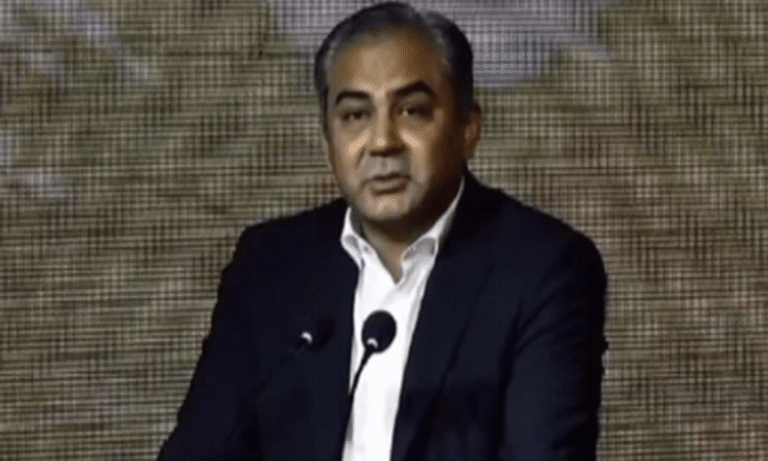Pakistan Cricket Board (PCB) Chairman and Asian Cricket Council (ACC) President Mohsin Naqvi on Thursday addressed the council’s annual general meeting in Dhaka, calling for participating nations to “put aside all political differences and work just for cricket”.
The meeting, hosted by the Bangladesh Cricket Board (BCB), comes ahead of the Asia Cup tournament, scheduled to be hosted by India in September. The tournament remains in limbo amid strained India-Pakistan ties following a military encounter in May.
On Wednesday, Hindustan Times reported that the Board of Control for Cricket in India (BCCI), reversing an earlier decision, would attend the Asian Cricket Council’s annual meeting virtually. The BCCI had previously declined to travel to Dhaka, citing tensions with Bangladesh and threatening to boycott the meeting.
Addressing the meeting, he said in an apparent reference to the ongoing situation: “It’s not just that you’re here; it’s about a team, as we discussed, that we need to work as a team. We need to put aside all our political differences and work just for cricket.”
The PCB chairman added: “It is a family of cricketing nations, where we all need to support and strengthen each other. The most important thing is, whoever wins means we all will win; so, let’s get together and discuss how we can strengthen the ACC and how we can help our associate members.”
He stressed that he wanted all member teams to have stronger players to put up a stronger competition, paving the way for a stronger market for cricketing events in Asia.
“As the president of ACC, I can assure you that we will do whatever is required to make this body the strongest body for Asian games,” he said, adding that it was important to expand cricket in other countries.
Whether Pakistan visit India for the Asia Cup or a hybrid model will be followed — similar to the one adopted for the International Cricket Council events — is yet to be decided.
However, considering that the BCCI and the PCB are not keen on playing on each other’s venues, particularly after the 2024 hybrid model, the UAE has emerged as a frontrunner to host the latest edition of the Asia Cup.
Last night, the BCB also hosted a dinner for ACC delegations and the Pakistani team. The PCB chairman thanked the associate members of the council and BCB President Aminul Islam for his hospitality during his speech at the meeting.
“He worked day and night to make this happen,” Naqvi said. “I am really looking forward to receiving him in Pakistan.”
Pakistan, Bangladesh team up to boost cricket, umpiring and youth development
Naqvi also met Bangladesh’s Minister for Youth and Sports, Local Government and Rural Development Asif Mahmood for a friendly and forward-looking discussion.
The two leaders talked about working together to promote cricket, train umpires and create more opportunities for young people in both countries.
The talks resulted in a broad agreement to strengthen bilateral cooperation in sports, particularly cricket, and the development of umpiring and youth engagement programmes.
The two sides agreed to sign a formal memorandum of understanding between the PCB and the Bangladesh Cricket Board (BCB) to promote cricket and institutionalise training programmes.
Naqvi invited Bangladeshi umpires to Pakistan for professional training, underscoring Pakistan’s willingness to share technical expertise and resources for regional sporting development.
Special focus was placed on enhancing women’s cricket, with both ministers agreeing to develop joint initiatives aimed at nurturing female athletes across both countries.
In addition to sports, the agenda extended to youth skill-building, employment generation and educational cooperation. Discussions included scholarship opportunities, higher education exchange programmes, and experience-sharing in educational reforms.
The ministers also explored collaboration in renewable energy, particularly solar energy innovation, marking a growing interest in sustainable technology exchanges.
Naqvi also introduced Pakistan’s secure identity infrastructure, highlighting the success and technological advancement of the National Database and Registration Authority.
Mahmood expressed a strong interest in Pakistan’s identity management systems and welcomed an invitation for a Bangladeshi delegation to visit Nadra. A high-level Bangladeshi delegation is expected to visit Pakistan in the near future to pursue this collaboration further.
Emphasising the demographic parallels between the two nations, Naqvi stated that youth made up the majority of both populations. “By investing in sports, skills, and education, we can create lasting opportunities for our young people,” he said.
The meeting signalled a shared commitment to deepening multifaceted ties between Pakistan and Bangladesh, particularly in sports diplomacy and youth development.

